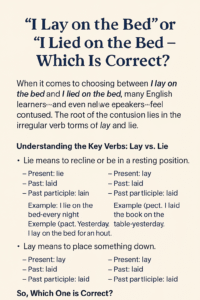“I Lay on the Bed” or “I Lied on the Bed” – Which Is Correct?-Grammar Puzzle Solved (16)
When it comes to choosing between “I lay on the bed” and “I lied on the bed,” many English learners—and even native speakers—feel confused. The root of the confusion lies in the irregular verb forms of “lay” and “lie.” These verbs are often mixed up because their past tenses don’t follow expected patterns. Let’s break this down step by step to see which sentence is correct and why.
Understanding the Key Verbs: Lay vs. Lie
To know which form is correct, you must first understand the difference between lay and lie.
-
Lie means to recline or be in a resting position.
-
Present: lie
-
Past: lay
-
Past participle: lain
-
Example: I lie on the bed every night.
-
Example (past): Yesterday, I lay on the bed for an hour.
-
-
Lay means to place something down.
-
Present: lay
-
Past: laid
-
Past participle: laid
-
Example: I lay the book on the table.
-
Example (past): I laid the book on the table yesterday.
-
So, Which One Is Correct?
If you are talking about yourself being in a resting position on the bed, then “I lay on the bed” is the correct past tense of “I lie on the bed.”
-
✅ Correct: I lay on the bed for a while.
-
❌ Incorrect: I lied on the bed for a while.
Why is “I lied on the bed” incorrect in this context? Because “lied” is the past tense of the verb “lie” meaning to tell a falsehood, not to recline.
-
✅ Correct use of “lied”: He lied to the teacher about finishing his homework.
More Examples to Clarify
-
Present tense: Every afternoon, I lie on the bed and read.
-
Past tense: Yesterday, I lay on the bed for a nap.
-
Future tense: Tomorrow, I will lie on the bed after lunch.
To contrast:
-
Present tense: I lay the towel on the bed.
-
Past tense: I laid the towel on the bed.
-
Past participle: I have laid the towel on the bed every day this week.
Conclusion: Always Choose Based on Meaning
To sum it up, if you are placing yourself on the bed to rest, use “I lay on the bed” as the past tense. If you are placing an object, then you use “lay” or “laid,” depending on the tense. And if you told a lie, only then should you use “lied.”
By remembering what each verb means and how their forms change over time, you will always choose correctly between “I lay on the bed” and “I lied on the bed.”

Difference Between Much and Many:
https://grammarpuzzlesolved.englishlitnotes.com/difference-between-much-and-many/
The Host in The Canterbury Tales: https://englishlitnotes.com/2025/06/07/the-host-in-canterbury-tales/
First Year at Harrow: https://englishwithnaeemullahbutt.com/2025/06/02/first-year-at-harrow/
The Four Elements by Bradstreet: https://americanlit.englishlitnotes.com/four-elements-by-bradstreet/
For grammar lessons, visit ChatGPT to explore the platform and interact with the AI: https://chat.openai.com
Discover more from Grammar Puzzle Solved by Naeem Ullah Butt
Subscribe to get the latest posts sent to your email.